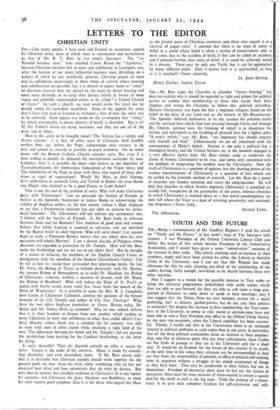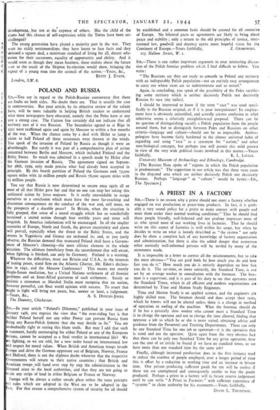YOUTH AND THE FUTURE SIR, —Being a contemporary of Mr. Geoffrey
Rippon's I read his article on " Youth and the Future" in last week's issue of The Spectator with interest. I was President of the Oxford University Liberal Club just before the writer of this article became President of the Conservative Association, and I would have given a more " conservative" estimate of the increase in their ranks. This article, claiming such an increase in their numbers, might well have been written by either the Liberal or Socialist Clubs of the University, and I can see that Mr. Rippon has made allowance for this by only claiming one-third of the membership of the cadets, leaving, fairly enough, two-thirds to be shared between these two other societies.
May I suggest as a reason for the possible increase in Tory ranks as being the attractive programmes embellished with noble names which they are able to put forward, for they are able to call upon a large pro- portion of Ministers to come down to speak at their meetings; may I also suggest that the Tories, from my own memory, muster for a social gathering, such as dinners, garden-parties, but do not take their politics as seriously? Yet despite this increase in their membership, the Tory mem- bers of the University, so prone to rally round at election-time, have not been able to vote a Tory President into office in the Oxford Union Society on the past two occasions, when the Liberal candidate has been success- ful. Finally, I would add that in the Universities there is an increased interest in political problems as such rather than in one party in particular; that all the three political associations claim an increase in their member- ship, and that to whatever party they pay their subscription, these Cadets are but birds of passage as they are at the University only for a short stay. It would be an ill-omen for the future of this country if its youth, at the only time in life when their criticism can be untrammelled as they are free from the responsibility of position, or office or political self-seeking, were to acquiesce without a struggle in the placid acceptance of things as they have been. -That may be pardonable in their fathers but not in themselves. Freedom of enterprise there must be but not the licence of enterprise; there must be some measure of State-control to ensure a square deal for the small as well as the big man. Truly the purpose of a demo- cracy is to give men complete freedom for self-expression and self- development, but not at the expense of others. Has the child of the slums had this chance of self-expression while the Tories have been un- challenged?
The young generation have played a majority part in the war. They want no sickly sentimentalism; they have learnt to face facts and they 'demand a square deal, a minimum standard of living for all, decent edu- cation for their successors, equality of opportunity and ability. And it would seem as though they mean business, these realists about the future —or so the result of the Skipton by-election would show, bringing the vigour of a young man into the council of the nation.—Yours, &c., Barry J. EvAms. London, S.W. 6.



























 Previous page
Previous page